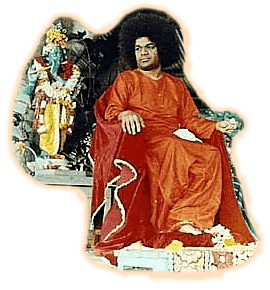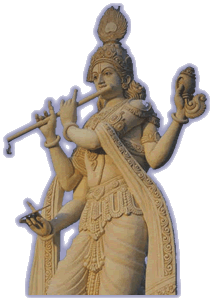|
Other Baba-books
|
||||||||
 |
The original
Sanskrit verses and with comments taken from the writings of
|
|||||||
|
'Detachment
from
All that is Material' (5)
'Once
arrived
at
the house of a young girl 1 2a 2b 3 4 5 6 7 8 9 10 11 12 13 14 15 16 17 18a 18b
More
than
the
adherent
of
the path of karma, jñāna or yoga,
the
follower of the path of bhakti is declared fortunate and
superior. He is better than the yogī, the sannyāsī, the
jñānī and the sadhaka who takes up the
discipline of karma. - Prasanthi
Vahini, p. 76
" Listen
to this chapter sung!
" " Listen to this spoken
chapter in Audio " arjuna uvāca Arjuna
asked
with
a
smile
and a little tremor of the lips, "Lord! I realize
that You are pleased with undeviating single-pointed devotion. But are
You pleased with the worship of You-with-form or You-without-form?
Do
You
prefer
sakara upasana or nirakara upasana? Which
melts You more and contributes to success in getting Your Blessings?
Which is easier for the sadhaka and more welcome to You?
Please tell me." - Gītā
Vahini,
p.
176 śrī
bhagavān uvāca Krishna
was
happy
that
this
question was asked. He said, "Arjuna! I do not make
any distinction between the two. I am pleased, however I am worshiped,
provided the mind is saturated with Me and there is steady faith in
every act, word and thought." Arjuna intercepted with the query,
"Krishna! Are mere purity of heart and steady faith enough? Do not sex
or status as fixed by caste or the stage of life form obstacles to
success?" Krishna chided Arjuna and replied, "I am surprised that you
should ask such questions after going through all of this experience.
Do you not realize that for those who have fixed their minds on God,
who have reposed in Me, the Personification of Truth, eternal and pure,
there will not be an iota of 'identification of the self with the
body', (deha-bhranthi) ... if they have still the awareness of sex or
caste or stage of life with all the attendant pride, humility, etc., it
only reveals that they have not surrendered their minds to God. For
those who have rid themselves of attachment to the body, there will not
be the distraction of caste, status, etc. "But
the
āśrama dharma and the varna dharma (the
codes of
conduct prescribed for the castes and for those in the four stages of
life (student (brahmacāri), house-holder (grihastha),
recluse (vānaprastha) and monk (sannyāsa)) do not hinder
in any way the discipline of fixing the mind on God or of purifying the
mind of evil or worshipping the Lord through all one's actions, words
and thoughts. The distinctions of sex or caste or status or stage of
life affect only those who live in the awareness of the body as reality
and act as if the world is absolute and eternal." - Gītā Vahini, p. 176-7 ye tv
aksharam anirdeśyam sanniyamyendriya-grāmam kleśo
'dhikataras teshām At
this,
Arjuna
said,
"Krishna!
The contemplation of the formless
characteristicless nirguna-nirakara is very difficult, is it
not, for those with deha-bhranthi or identification of the self
with the body? The worship of the form-ful aspect of God, which is in
reach of the ordinary man, can this yield purity of mind, purity of
inner instruments of consciousness? Please enlighten me. "Arjuna!
People
think
that
the
worship of God with form and attributes is quite
enough. This discipline will only be of some help; it will guide the
person along the road for a little while. For the Lord will not
condescend to grant liberation for just this! For he who aims at
liberation must first give up attachment to the body. Without that, the
atmic stage cannot be attained. The identification
with the body is the expression of ignorance. The ātmā must be
recognized as distinct from the prakriti." - Gītā Vahini, p. 177-8 ye tu
sarvāni karmāni teshām aham
samuddhartā mayy eva
mana ādhatsva atha cittam
samādhātum "You might
therefore ask, 'Have we no other means?' My reply is, 'Yes, there iś.
Even those who are eager to engage themselves in acts that please Me
can get established in the atmic consciousness and gain liberation. By
means of prayer, recitation of the name, adoration of the glory,
worship, etc., the sins of the past can be destroyed, the inner
consciousness purified of impulses and urges; then the light of wisdom
will dawn, leading to liberation from darkness." -
Gītā Vahini, p. 179 abhyāse 'py
asamartho 'si Devotion
to
the
Lord
is
only a form of discipline to reach the goal. The seeker
should not stop with the acquisition of devotion; he should pay
attention not so much to the devotion or love that he has toward the
Lord, but to the love and grace that the Lord bestows on him! He must
always be eager to find out which behavior of his, what acts of his,
will be most pleasing to the Lord, will fill the Lord with anandam.
Inquire
about
that,
yearn
for that, carry out the things that will
secure that objective - be engaged in acts conducive to gain it - that
is real bhakti. But
people
generally
do
not
follow this ideal of bhakti, nor do
they think about the implication of that ideal. They pay attention only
to the love that the devotee has to the Lord; and in the process, they
do not pay much attention to the dharma and the karma
that the Lord approves or appreciates! This is why Krishna says, "Karma
that
pleases
the
Lord
is superior to the kama that fulfills the
yearnings of the devotee." Whatever the devotee does or thinks or
plans or observes, they should draw down the grace of God". They should
not be subject to his own will; they should be in accordance with His
Will. The devotee must test every thought and feeling on the touchstone
of the Lord's declared preferences. -
Gītā
Vahini, p. 179-80. athaitad
apy aśakto 'si This
is
that
path:
Establish
your mind and intelligence in Me. If you cannot
accomplish this and find it difficult, give up your egoism and carry on
activities that are moral and holy. If even this is too difficult, give
up attachment to the fruits, the consequences of all your acts; offer
them to Me as Krishna-arpanam. Offering your acts to Me should
not be a mere vocal exercise. Take care that you do so, by word, by
deed and by thought, mano-vak-kaya-karma, as they say.- Gītā Vahini, p. 187. śreyo hi
jñānam abhyāsāj Take
note
of
this.
The
aspirant for grace must have before his mind the act
and not its consequence, beneficial or otherwise. That is the reason
why Gopala said that jñāna is superior to abhyāsā,
dhyāna is superior to jñāna, and the giving
up of attachment to the consequences of your acts is superior to dhyāna.
Such
nonattachment,
Krishna
said,
will confer śāntih. -
Gītā Vahini, p. 187 The
Gītā says, śreyo hi jñānam abhyāsāj. Abhyāsā
or practice is the crux of the problem. Through that, victory can be
won. Concentration can be mastered in dhyāna and this will lead
to disinterestedness in the results of one's actions, for the actions
are not one's own, but God's. The results too are not one's; they are
God's. When you become detached from the fruits of your actions, though
intent on action (offering to the Lord your skill and energy), then,
you attain peace of mind, prasanthi. If, however, you cultivate
attachment to the things of the world, land and houses, bank balances
and insignia of power, then attachment towards God weakens and
concentration in dhyāna fails - Sathya Sai Speaks VII, p. 407 adveshthā
sarva-bhūtānām santushthah
satatam yogī These
are
the
signs
of
true sneha, and it is only when you are on the
godward journey along the nine stages of bhakti that you can
attain this divine ideal of true friendship - Sanathana Sarathi, Sept.
1979, p. 167 "That
is
to
say,
you
will have to rid yourself of the feelings of 'Mine' and
'I'. They are not distinct; the first springs from the second and both
arise from ajñāna, the ignorance of the fundamental truth. For,
once rid of ajñāna, the sense of 'I' and 'Mine' will not give
trouble; they have no place in him. Hence, it is laid down that the
aspirant for bhakti must possess santushthah satatam,
contentment always. What does this mean? It implies contentment under
all conditions, good health or illness, loss or profit, grief or joy.
Whether one's wish is fulfilled or not, the mind should not lose
equanimity and poise. - Gītā
Vahini, p. 189 The
Gītā says you must be adveshthā sarva-bhūtānām,
without
hatred
to
all
beings; but, that is not enough. A wall has no
hatred towards any being! But, is that the ideal? No. You must
positively love all beings, actively love, actively engage yourself in
acts of love. That alone can win the grace you crave for. - Sathya Sai Speaks VII, pp.
465-6 yasmān
nodvijate loko The
mind
loses
balance
if
the slightest obstacle arises in the path it
frames for itself. It is so fickle. Why, if the cup of coffee is not
forthcoming in time, if you miss seeing two films in one week, if you
could not squat before the radio both in the morning and the evening
for long hours; if many such trifles are denied or disturbed, you feel
overshadowed by discontent. Santushthah is
the state of mind that is unaffected by the
achievement or non-achievement of any wish, the happening or
nonhappening of any event; the mind must be undisturbed, without
excitement or disappointment -
Gītā Vahini, p. 189-90 anapekshah
śucir daksha yo na
hrishyati na dveshthi The Gītā
declares that though a person may have deep devotion to the Lord, he
cannot be called a bhakta if he lives without regard to the
commands of the Lord; that is, the dharma laid down in the śāstras,
which
embody
His
orders,
revealed to saints and seers. It is in this
sense that Krishna uses the word bhaktimān, when He declares in
the Gītā, 'bhaktimān yah sa me priyah'. - Gītā Vahini, p. 180 samah
śatrau ca mitre ca tulya-nindā-stutir
maunī ye tu
dharmyāmritam idam What a grand idea this sloka
conveys! This is the concluding sloka of the series that gives
the qualities one has to develop. It calls the entire group dharmyāmritam,
the
dharmic
way
to
immortality! The Lord has declared therein that
those who have these qualities, those who trust in Him as the only
ultimate goal, those who are attached to Him single-mindedly are
dearest and nearest to Him. Note
the
expression
dharmyāmritam used here. Ponder over it and draw
inspiration from it. The nectar of the Lord's grace is deserved only by
those who adhere to the Lord's dharma. Simple folk believe they
have bhakti towards the Lord; but they do not pause to inquire
whether the Lord has love towards them! People who pine to discover
this are rather rare. That is really the true measure of spiritual
success. -
Dharma Vahini, p. 18
|
||||||||




